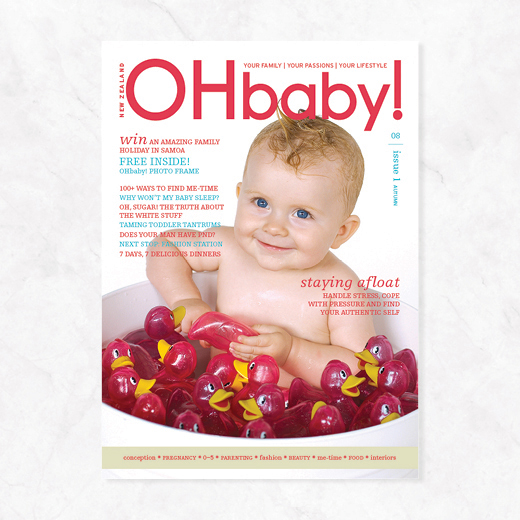Keeping the spark alive

When 'couple' becomes 'family', your journey together takes a new turn. While it's an exciting time, the arrival of a baby can wreak havoc on the balance you and your partner had worked out in your relationship. It can be all too easy to forget why you're with your partner in the first place. Remember that 'newlywed' feeling of dewy-eyed rapture you got every time you looked your loved one in the eye? What happened to it?
The ring is on your finger, you've merged the contents of your bookshelves, and the future is spread out before you, filled with opportunities and excitement. But bring a seven-pound newborn baby into the picture and the home front changes dramatically. Sure, you and your partner will have precious moments of standing together, gazing down at your bundle of joy, rapt with the wonder of your creation. But sleep deprivation is all too common, and time for yourselves as a couple can erode just as demands on you as parents intensify. Additionally, previously unknown differences in beliefs, values, expectations and skills can rise up and gnash their teeth, throwing you off-balance as a couple and shaking your relationship's foundations.
When you vowed to love each other "for better or for worse", you probably didn't expect that it would feel so difficult. Having a baby often magnifies the shortcomings in a relationship, and the time and energy those little ones demand can cause you to take for granted the many positive attributes that each partner brought to the relationship in the first place. You might even question why you're with your partner, and wonder how you're ever going to get through these full-on days. When it's a challenge finding a moment to brush your teeth in the morning, how can you make the time for your marriage?
At the same time that you may be feeling like your marriage is at its lowest point, there are other couples who seem to sail through the challenges of early parenthood, managing the changes easily and strengthening their relationship as a couple. This is what we all seek and admire. But how can we too sail through while deepening that loving feeling - and what can we learn from those who already seem to know the secret of surviving and thriving together?
Here are ideas for reigniting the spark in your relationship.
❤️ Make your marriage your priority ❤️
First and foremost, you need to remain focused on the end goal of having a great relationship with one another. You or your partner may be coping with an identity crisis after leaving a job to look after the new arrival, could be facing financial pressures, may be drawn into family feuds, might need to cope with a sick child... There are so many stressful possibilities. But whether you're in a valley or on top of a mountain, the need to dedicate thought and energy to your relationship - especially when time is scarce - is key.
When a baby arrives, its needs and vulnerability awakens our instincts to care for and protect them. However, to do so should not be to the detriment of your marriage. There's no point being a martyr or self-sacrificial to the point that there is little left over to give to one another. To nurture, care for, stimulate and protect your child are priorities, but these must be balanced with your other roles of being a husband and wife to each other. Finding a good balance is a continual process that will need to be revisited.
It may seem impossible at first, but it gets easier with practice. Do some of the things you used to enjoy doing together. Go on a date, do a project together, and repeat some of the actions and words that came easily to you early on in your relationship. Say or write words of appreciation to one another, do random acts of kindness, and give affection. A simple hug or "I love you" can work wonders. Relate to each other! Foster friendship, respect and enjoyment of one another by spending time learning about each other's hopes, dreams and fears. Share your highs and lows, the embarrassing moments, the great and the most frightful times in your life, and talk about how these have shaped who you are. Plan and set goals together about where you'd like to be in five years' time in relation to your leisure/travel activities, your relationship, family life, social life, spiritual life, financial position and health.
❤️ Stop playing the blame game ❤️
Put an end to your negative behaviours. Stop blaming and criticising. Neither helps to change your relationship for the better, and both are actually predictive of marital instability and separation. Fortunately, blame and criticism are learned behaviours and can be changed, with effort. Focus on how you can help improve your relationship. How do you contribute to the problem or issues, and what can you do to reduce conflict? Can you walk away when discussions get too heated and agree to talk about it later when both of you are calm? Can you change the tone of your voice and remove that sarcastic undercurrent? If you have noticed that your moods are low and you are sleep-deprived, organise with your friends, family or neighbours to get a babysitter or some time-out so you can catch up on some sleep, and see your GP if necessary if you need further help.
❤️ Calm down ❤️
Plan to discuss problems when you are calm. No one is able to hink rationally when in a heated or upset state. It usually ends in disaster, with hurt feelings, or worse! Welcome humour into your discussions of the serious issues as it can defuse tense moments and also give perspective to the issue at hand. Poke a funny face or say a word that will make you both crack up laughing. Call each other's behaviour into account. "You're getting off-topic, so let's refocus" or "Stop yelling" might be necessary catchphrases as you learn how to talk about the big stuff in a rational way. Some topics may simply not be worth discussing, as no agreement is likely to be reached, so choose your battles. If it is absolutely necessary to reach an agreement about something, like a legal issue, seek mediation from an outside, objective source. Yet be realistic about your expectations of one another, as men and women are very different.
❤️ Learn to be a great communicator ❤️
Dr John Gottman and Nan Silver's book The Seven Principles for Making Marriage Work mentions what they call "the four horsemen". These are destructive communication techniques that couples use at their peril. They are described as defensiveness, contempt, criticism and stonewalling. To be defensive is to not listen and be preoccupied with giving excuses and laying blame elsewhere, avoiding ownership of the problem and change. To be contemptuous is to be dismissive of the other person's opinion or to consider it as having little value ("I'm not wasting my time on this - I've heard it all before"). To criticise is to put down and make negative comments about the other person "You are just being stubborn, you'll never change." To stonewall is to ignore and not engage in conversation.
These "four horsemen" erode a couple's honour or respect of one another, leading to unhappiness and instability of the relationship. Engaging in any one of these negative practices serves to model poor communication behaviour to our children, and endorses disrespect of one of the child's parents. If these are commonplace in your relationship, seek out couple-focused courses and communication skills courses. Counselling may also be able to help.
❤️ Share responsibilities ❤️
Talk about your responsibilities and chores as a parent. Discuss what you each perceive your role to be, and reach a consensus about these roles. Review your "job description" from time to time, as changes occur in your responsibilities and your children go through different developmental stages. Attempt to give each partner some time for themselves, perhaps to pursue something hey used to enjoy doing before children came along - playing tennis or golf, going to the gym, working on crafts, participating in a book club.
But be realistic about what can reasonably happen. Though it is a good idea to have the working parent come home to help a stay-at-home parent following a busy day at work, recognise that you both work hard, and make sure that each person gets a break. Expecting a baby's night waking to be attended by both parents may not be practical, as the parent who works outside the home needs to be able to function well at their job too, lest they lose this job or, worse, injure themselves.
Be sure to allow your baby plenty of time with each parent so he or she bonds with both Mum and Dad, and can therefore be consoled by either parent. The partner who spends most of their time in paid work can do some routine aspects of caring for the infant, such as the evening bath, or weekend breakfasts. This allows for bonding time and provides the other parent with a well-deserved break. If you're the stay-home caregiver, don't be too quick to come to the rescue or aid of the other parent if the baby is crying - allow him to make mistakes and learn to manage in his own way. This means that either parent can have a break without feeling anxious about leaving the baby with his or her partner for periods of time.
❤️ Back each other up ❤️
Work as a team, consistently supporting each other when disciplining children, and make sure to discuss parenting issues and heavy topics away from the children. A child watching unresolved and recurring heated conflict between parents will be harmed, and is put at greater risk of developing short-term and/or long-term negative outcomes.
❤️ Talk every day ❤️
Make a habit of talking with each other every day and to catch up on the day's events, share thoughts and make plans. A parent who stays home may be desperate for some adult conversation, yet the parent who works outside the home might need a little space before he can jump right into interacting with the family. Talk about these needs and trial a plan you devise together, such as when one parent arrives home from work, he or she greets everyone, has a shower, then comes down and you talk about each other's day. Then he or she takes over caring for the baby while the other partner makes dinner, and the family sits down together to eat.
Different plans will work for different couples, so trial them for a set time and discuss things a week later. Each partner should have the opportunity to say what went well with the plan and what could be better. Then decide to either continue with the same, adapt and change, or develop a new plan. Recognise that for many men and women, communication styles and patterns vary, so this may be a tough ask for some partners, particularly the Kiwi bloke!
The differences between how humans relate and how this works in relationships is nicely expanded on in Gary Chapman's book The Five Love Languages: How to Express Heartfelt Commitment to Your Mate. Chapman explains that all of us enjoy all five "love languages" - gifts, affection and touch, quality time, praise and encouragement, and doing things for the other - yet for most people, there will be a preferred love language that is most meaningful in helping them to feel loved by their partner.
Some people prefer to express their love to their partner by doing helpful jobs. I remember my father putting an automatic switch in the pantry for my mum without her asking, simply to make life easier for her. Others like to buy flowers or are great conversationalists. Understanding one another in this regard can be a real eye-opener, and make our efforts to relate to each other more purposeful and effective. So getting flowers may not be as effective in expressing your love for your partner as organising to go on a date or fixing a wobbly table. Learn what works for your partner.
❤️ 'Seek first to understand, then to be understood' ❤️
In his book The Seven Habits of Highly Effective People, Stephen Covey points out that we should "Seek first to understand, then to be understood." Only from such a premise can good communication flow. Meaning, make an effort to see where your partner is coming from, and only then, help him or her to understand your perspective.
Avoid destructive habits such as interrupting, sarcasm, raising your voice, or not paying "real" attention to what your partner is saying. Speak clearly and calmly, and be ready to explain. Listen to understand how your partner feels and what he or she is saying before saying your own piece. If you practise this, misunderstandings are avoided and authentic listening occurs.
This is so frequently the difficulty between couples - often, they are no longer feeling understood by one another, like the wife who laments, "He always works late. He doesn't like to spend time with me. Doesn't he love me?" The real story might be that her husband is working late to score extra points with the boss in order to secure a promotion or salary rise, which will improve their family's financial security. Don't immediately jump to the worst conclusion - try to see what else is going on and understand each other's point of view.
❤️ Do it together ❤️
Create unity by developing family or couple rituals that are meaningful, such as eating together at the dinner table every night, switching off the TV at times when the family is together, going on evening walks with the baby in the pram, or creating special habits around saying goodbye or greeting one another. Make an effort to decide on weekend activities together, setting aside "couple time" to spend with each other without the baby. Institute a weekly "chill out" day, or develop traditions for what your family will do for birthdays, holidays and special occasions.
❤️ Apologise ❤️
Be prepared to say "I'm sorry for..." when you are in the wrong, without giving excuses or trying to justify yourself. Consider the issues and the weight or significance of your disagreement in the scheme of things. Do you want to win the argument to salve your ego? Is it really important whether the house is spotless, you get a dog, or you visit a relative on the way to your holiday destination? Some issues are perhaps not worth the stress and grief they may cause. Be prepared to compromise. You are on a journey to interdependence, and you both need to be prepared o give and take. The gains of having a happy, stable marital relationship are immense, and remember that nothing great is easily won. How true is that when considering your relationship?
❤️ Ask for help ❤️
Seek professional help if, after having discussed it with your partner, you continue to be unhappy in your relationship and/or conflict is frequent. Do so especially if children are involved. Children need stability, predictability and a loving, caring environment and do not cope well in a conflict-riddled home where disagreements are frequent and unresolved.
An insightful analogy I frequently refer to is that a marriage is like the hub of a wheel. When it's running smoothly and in the right direction, those travelling along - the parents and children - thrive! When it is not, all suffer, including the children, who are powerless to do anything about it.
Particularly in New Zealand, the challenge is to make the time to nurture your relationship, since our work hours are among the longest in the Western world. So set achievable, realistic goals, to make it more likely for new, positive behaviours to emerge and become patterns over time. A good start may be to use the Relationship Booster Checklist below, or develop your own.
Relationship booster checklist
As a starting point, here is a checklist for enhancing your relationship. Try to do each of these things every week. Add or change them over time, as your needs as a couple change and as your relationship deepens and grows.
❤️ Ask about my partner's day
❤️ Offer help when my partner seems busy/stressed
❤️ Listen to my partner
❤️ Give my partner a hug
❤️ Say "I love you!"
❤️ Express appreciation to my partner
❤️ Do something nice for my partner
❤️ Discuss chores/responsibilities
❤️ Share and talk about my experiences, hopes, and dreams with my partner
❤️ Refrain from ____________________ (fill in with a negative communication habit)
Further reading
• The Five Love Languages: How to Express Heartfelt Commitment to Your Mate, by Gary Chapman
• The Seven Principles for Making Marriage Work, by Dr John Gottman and Nan Silver
• The Seven Habits of Highly Effective People, by Stephen Covey
• Triple P tip sheet "Supporting Your Partner" (available through KEY Psychology)
| Pauline Ogilvy is a registered psychologist with KEY Psychology (Child-Family-Education), based in Rodney and the North Shore, Auckland. Pauline is a parent of three. |

AS FEATURED IN ISSUE 1 OF OHbaby! MAGAZINE. CHECK OUT OTHER ARTICLES IN THIS ISSUE BELOW

















